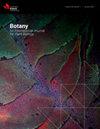通过标准化实验设计在地中海城市地区测试宫胁方法
IF 1.3
4区 生物学
Q3 PLANT SCIENCES
引用次数: 0
摘要
植物学,提前印刷。 宫胁方法是由宫胁彰开发的,它通过在紧凑的空间种植多种本地物种来恢复自然森林,从而迅速形成紧凑、有弹性的生态系统。该方法最初在日本取得成功,随后在全球范围内得到广泛应用,但在地中海城市地区仍然很少见,尽管该方法具有提高生物多样性和减缓气候变化等优点。地中海气候面临着城市热岛和生物多样性丧失等独特挑战,文献和实践中对这种方法在地中海气候中的有效性探索不足。我们正在意大利领导一个项目,以确定最佳植物组合,解决该方法在城市环境中的文献空白问题。该项目探索了 "微型森林 "在提供生态系统服务和改善城市宜居性以应对极端气候方面的潜力。本说明文件详细介绍了这一实验应用所采取的方法步骤,提供了一种量身定制的方法来测试该方法在地中海城市环境中的适应性和影响,为城市绿化和恢复能力提供了一个重要机会。本文章由计算机程序翻译,如有差异,请以英文原文为准。
Testing the Miyawaki method in Mediterranean urban areas through a standardised experimental design
Botany, Ahead of Print.
The Miyawaki method, developed by Akira Miyawaki, restores natural forests by planting diverse native species in compact spaces, rapidly creating compact, resilient ecosystems. Initially successful in Japan, its global application bloomed but remains rare in Mediterranean urban areas despite benefits like biodiversity enhancement and climate change mitigation. This method's effectiveness in Mediterranean climates, which face unique challenges like urban heat islands and biodiversity loss, is underexplored in literature and practice. We are leading a project in Italy to identify optimal plant assemblages, addressing the method's documentation gap in urban settings. It explores the potential of Tiny Forests to provide ecosystem services and improve urban liveability against climatic extremes. This note paper details the methodological steps undertaken in this experimental application, offering a tailored approach to test the method's adaptability and impact in Mediterranean urban environments, suggesting a significant opportunity for urban greening and resilience.
The Miyawaki method, developed by Akira Miyawaki, restores natural forests by planting diverse native species in compact spaces, rapidly creating compact, resilient ecosystems. Initially successful in Japan, its global application bloomed but remains rare in Mediterranean urban areas despite benefits like biodiversity enhancement and climate change mitigation. This method's effectiveness in Mediterranean climates, which face unique challenges like urban heat islands and biodiversity loss, is underexplored in literature and practice. We are leading a project in Italy to identify optimal plant assemblages, addressing the method's documentation gap in urban settings. It explores the potential of Tiny Forests to provide ecosystem services and improve urban liveability against climatic extremes. This note paper details the methodological steps undertaken in this experimental application, offering a tailored approach to test the method's adaptability and impact in Mediterranean urban environments, suggesting a significant opportunity for urban greening and resilience.
求助全文
通过发布文献求助,成功后即可免费获取论文全文。
去求助
来源期刊

Botany
生物-植物科学
CiteScore
2.20
自引率
9.10%
发文量
48
期刊介绍:
Botany features comprehensive research articles and notes in all segments of plant sciences, including cell and molecular biology, ecology, mycology and plant-microbe interactions, phycology, physiology and biochemistry, structure and development, genetics, systematics, and phytogeography. It also publishes methods, commentary, and review articles on topics of current interest, contributed by internationally recognized scientists.
 求助内容:
求助内容: 应助结果提醒方式:
应助结果提醒方式:


